Frankenstein Blu-ray Movie
HomeFrankenstein Blu-ray Movie 
The Man Who Made a MonsterUniversal Studios | 1931 | 70 min | Not rated | Sep 17, 2013
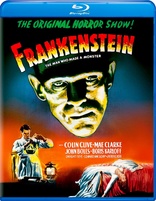
Movie rating
8.1 | / 10 |
Blu-ray rating
| Users | 4.2 | |
| Reviewer | 4.0 | |
| Overall | 4.0 |
Overview
Frankenstein (1931)
A crazed scientist creates a living being from body parts, not realizing it has a madman's brain.
Starring: Colin Clive, Mae Clarke, John Boles, Boris Karloff, Edward Van SloanDirector: James Whale
| Horror | Uncertain |
| Sci-Fi | Uncertain |
Specifications
Video
Video codec: MPEG-4 AVC
Video resolution: 1080p
Aspect ratio: 1.35:1
Original aspect ratio: 1.37:1
Audio
English: DTS-HD Master Audio Mono (48kHz, 24-bit)
French: DTS Mono
Subtitles
English SDH, Spanish
Discs
50GB Blu-ray Disc
Single disc (1 BD)
Playback
Region A (B, C untested)
Review
Rating summary
| Movie | 4.5 | |
| Video | 4.5 | |
| Audio | 3.5 | |
| Extras | 4.0 | |
| Overall | 4.0 |
Frankenstein Blu-ray Movie Review
"It's alive... it's alive, it's alive, it's alive!"
Reviewed by Kenneth Brown September 28, 2012Take a moment and imagine what modern horror would be without Universal Pictures. Without founder Carl Laemmle and his vision for the future of cinema, or his son Carl Laemmle Jr., who inherited the keys to the studio kingdom in 1928, when talkies were rapidly displacing silent films and promising groundbreaking new strides in moviemaking and the movie-going experience. Without early horror pioneers like Tod Browning, James Whale, Karl Freund, George Waggner or Jack Arnold. Without iconic creature actors Bela Lugosi, Boris Karloff, Claude Rains, Lon Chaney, Jr., Elsa Lanchester or Ben Chapman. Without Dracula, the indispensable 1931 classic that left a more lasting mark on vampire movies and lore than any other vampire film before or after (save Nosferatu). Or Frankenstein, which pushed boundaries, shocked audiences and has been received with overwhelming enthusiasm ever since. The Mummy, bold in its atmosphere and unforgettable in its tragic romance. The Invisible Man, which features some of the most astonishing special effects and perhaps one of the most unnerving depictions of mounting madness of the era. The Bride of Frankenstein, a complex, wickedly funny, altogether unpredictable sequel that in many regards surpasses its predecessor. The Wolf Man, a once-chilling character drama that examines the frailty of man and the beast within. Phantom of the Opera, though more a twisted love story than a traditional horror picture, a film that nevertheless caused some theaters to stock smelling salts in in the event that a moviegoer fainted upon the removal of the Phantom's mask. Or Creature from the Black Lagoon, which frightened audiences above the water and below with a scaly monster unlike any they had seen before. Needless to say, modern horror, and really the genre in whole, would be completely different than what we know.
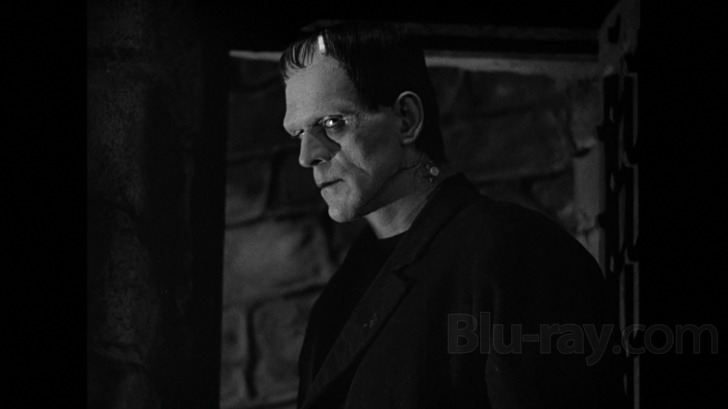
Dracula may be one of the most iconic horror films of the Golden Age of Horror, but it hasn't withstood the test of time as well as the second essential classic in Universal's Essential Collection: director James Whale's Frankenstein, starring Colin Clive as renegade scientist Henry Frankenstein, High Prince of Horror Boris Karloff as Dr. Frankenstein's unnamed monster, Mae Clarke as his devoted fiancée Elizabeth, Dwight Frye as his dutiful hunchback assistant Fritz, and Edward Van Sloan as Frankenstein's old mentor, Dr. Waldman. Steeped in ambition, rejection and tragedy, Frankenstein is an entirely different beast than Dracula, and not just because the two creatures are so radically different from one another. While both films were released in 1931, Frankenstein feels scarier, sharper and more substantial; in part because the story of a man playing God is more gripping than the story of a god preying on man, but also because Whale is simply a surer, steadier filmmaker than Browning. His creature feature doesn't envy or romanticize its beast in any way, nor does it shy away from duality or base impulses on any front, human or monster. Of course, that would all be for naught if it weren't for a single force of silver screen nature: Karloff, who was launched into stardom with Frankenstein, and for very good reason. His monster is frightened, kindly, menacing, sympathetic, impulsive, angry and, all at once, misunderstood. More than a hulking monstrosity, more than an abandoned child, more than the sum of his stitched together body parts, Karloff infuses Frankenstein's abomindation with pathos, no small feat considering the one-dimensionality of many a horror monster.
Frankenstein Blu-ray Movie, Video Quality 
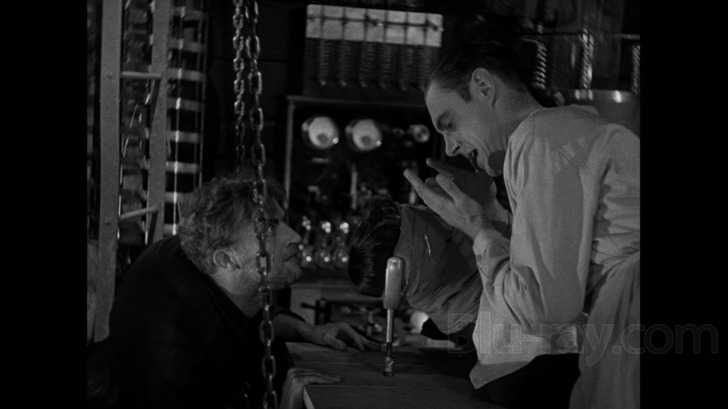
Frankenstein's restoration may not be as subjectively striking as Dracula's, but it's no less commendable and impressive. Everything from contrast inconsistencies to grain spikes, print flicker and fluctuations, scratches and specks (which rarely make an appearance), and other inherited issues have been managed with care, and without undermining the detail of the original photography, thwarting the filmmakers' intentions, or robbing the image of its filmic qualities. There isn't any evidence of quick-fix manipulation or debilitating noise reduction, and the relative softness and darkness of Arthur Edeson's photography are the only things that might give the untrained eye pause, particularly if direct comparisons are being made to other films in the Essentials Collection. Black levels are deep and ominous (even if gray tones are a tad heavy on occasion), edges are clean and satisfying (just not razor sharp), and textures, where apparent, have been preserved. The encode itself is proficient as well, without any serious macroblocking, banding, smearing or errant oddities that might inspire videophiles to arm themselves with torches and pitchforks.
Frankenstein Blu-ray Movie, Audio Quality 

Frankenstein lumbers out of the lab with a somewhat problematic two-channel DTS-HD Master Audio Mono mix; one that isn't as rewarding or revelatory as the lossless track afforded Dracula. Whether all of the difficulties trace back to lesser audio elements is unclear. What is clear is the noise floor and air hiss that haunt much of the film, the brash (but bearable) distortion that curses more chaotic sequences, and the at-times muffled or tinny voices of the actors. Admittedly, dialogue is clear and intelligible on the whole, and the film isn't weakened by any of the track's shortcomings. Strides have been made in drawing out subtleties once thought lost, and the soundscape is often clean and neatly prioritized. Not enough to warrant high praise or, given the liklihood that this is the best Frankenstein can sound with the audio elements available, too much excitement. But enough to make Universal's DTS-HD MA track more than serviceable. Considering the age of the film, I'd even go so far as to call it a valiant effort.
Frankenstein Blu-ray Movie, Special Features and Extras 
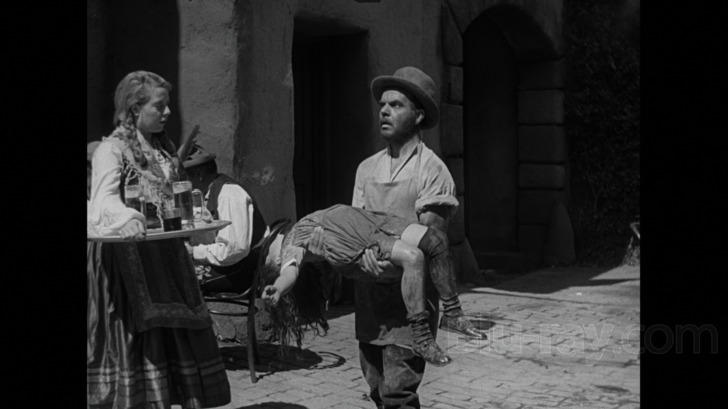
- The Frankenstein Files: How Hollywood Made a Monster (SD, 45 minutes): Film historian David J. Skal hosts this lengthy look back at Mary Shelley's original book, the development and departures of James Whale's classic 1931 adaptation, the influence the film has had on cinema, and more.
- Karloff: The Gentle Monster (SD, 38 minutes): With an ability "to lure them inside," Boris Karloff carved out a unique, hard-working Hollywood life and career, and injected something into the horror movie that pushed the fledgling genre well into the modern-monster age.
- Universal Horror (SD, 95 minutes): Filmmaker and part-time narrator Kenneth Branagh guides horror fans on a journey through Universal's horror canon, touching on all of the movies included in the Classic Monsters collection, and some that are not.
- Audio Commentaries: Film historian Rudy Behlmer reads from a prepared essay throughout the duration of the movie, while historian Sir Christopher Frayling, while obviously relying on notes of his own, breaks free of his prepared materials to forge a more conversational commentary. There's value in the first, but there's value, a more fascinating dissection and an effortlessness to the second.
- 100 Years of Universal: Restoring the Classics (HD, 9 minutes): Rather than a Frankenstein-centric restoration featurette, like the one that accompanies Dracula, this is a general catch-all. It's appreciated, but not nearly as revealing.
- Boo!: A Short Film (SD, 10 minutes): A 1932 parody short from writer/director Albert DeMond.
- Frankenstein Archives (SD, 9 minutes): Movie posters, campaign art, production stills and other images.
- Trailer Gallery (SD, 8 minutes): Frankenstein, The Bride of Frankenstein, The Ghost of Frankenstein, Frankenstein Meets the Wolf Man and House of Frankenstein.
- Monster Tracks (HD): A standard trivia track rounds out the package.
Frankenstein Blu-ray Movie, Overall Score and Recommendation 
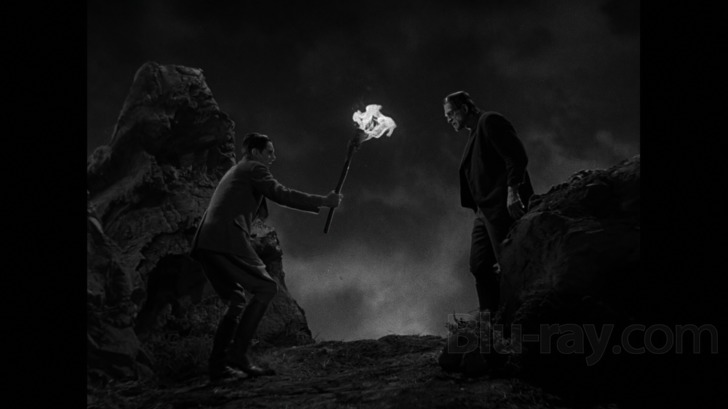
If Frankenstein isn't the strongest film in the Universal Classic Monsters: Essential Collection, it certainly comes close. It's more grounded than its brethren, deals with more unsettling themes, features more engrossing performances, and boasts the quiet confidence of Karloff, even when playing a frightened behemoth. It's also arguably the most influential of the bunch; a forerunner to the horror greats that would follow in its footsteps and help the genre evolve beyond its humble roots. The Blu-ray edition isn't quite so reliable -- while its restoration and video transfer cast new light on an old favorite and its supplemental package has a lot to offer, its DTS-HD Master Audio Mono mix doesn't fare so well -- but that shouldn't prevent anyone from adding Frankenstein to their collection. Its highs far, far out-pace its lows, making it that much easier to overlook its flaws and reconnect with an early horror classic that, even in its own humble origins, holds up.
Other editions
Frankenstein: Other Editions

Frankenstein 4K
1931

Frankenstein 4K
1931

Frankenstein 4K
1931

Frankenstein
w/ Glow in the Dark Art
1931

Frankenstein
The Man Who Made a Monster
1931

Frankenstein
The Man Who Made a Monster
1931
Similar titles
Similar titles you might also like

The Bride of Frankenstein 4K
1935

The Invisible Man 4K
1933

The Wolf Man 4K
1941

Dracula
Includes "Drácula"
1931

Frankenstein Meets the Wolf Man
1943

Abbott and Costello Meet Frankenstein 4K
1948

House of Dracula 4K
1945

Island of Lost Souls
Uncut Theatrical Version
1932

Creature from the Black Lagoon 4K + 3D
1954

Son of Frankenstein
1939

House of Frankenstein 4K
1944

The Black Sleep
1956

Drácula 4K
1931

The Mummy 4K
1932

The Ghost of Frankenstein
1942

The Body Snatcher
1945

The Curse of Frankenstein 4K
Warner Archive Collection
1957

The Corpse Vanishes
1942

The Invisible Man Returns
1940

The Mummy's Ghost
1944